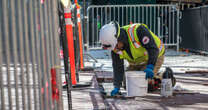When Meta established its Oversight Board to adjudicate on decisions it made about removing content from its platforms in 2020, the goal was for the select group of individuals from the media, civil society, and academia, to act as a check on the tech company’s decisions.
But as Meta dramatically overhauled its approach to content moderation and fact-checking this week, many have asked whether the near-five-year experiment, which Meta has reportedly spent $280 million on, was a successful one—or simply a clever piece of PR strategizing.
“Let’s be honest,” says Tim Fullerton, president and CEO of Fullerton Strategies and a former director of digital strategy under President Barack Obama. “I can’t point to a single issue of significance in which the oversight board did anything to change Meta’s behavior.”
University of Mississippi law professor Antonia Eliason points out that, given Meta has said it will be disavowing its fact-checking partners in the future in the United States, the role and purpose of the Oversight Board becomes more opaque. “Many of their cases involved reviews of decisions made by fact-checkers,” she says. “What is there to review if there is no content moderation?”
The Oversight Board’s response to Meta’s latest moves—under which users would be permitted to call LGBTQ+ users mentally ill, and to say that women are “household objects” and “property,” while forgoing fact-checking on posts in the United States—has been particularly baffling. Tech journalist Casey Newton described the Oversight Board’s statement, which said it “welcomes the news that Meta will revise its approach to fact-checking” as “disturbingly obsequious.” (The statement was later revised to say the Board would be “reviewing the implications of the various changes in line with its commitment to freedom of expression and other human rights.”) The cochair of the Oversight Board, former Danish Prime Minister Helle Thorning-Schmidt, went into damage control after the initial statement received flak, telling the BBC that she was “very concerned” about the changes, and that she had “huge problems” with the plans.
But longstanding critics of the Oversight Board see the same old problems, only more people are paying attention. “Meta’s Oversight Board should resign en masse,” says Ben Wyskida, a spokesperson for the Real Facebook Oversight Board, an independent group set up in response to fears the Oversight Board would be toothless. “Whether for their own values or for the realization that they have been sidelined, ignored, and marginalized, the experiment has failed.”
The Oversight Board often touts its successes, claiming in its 2023 Annual Report that Meta fully or partially implemented 75 recommendations—which are nonbinding—it had made since its establishment. But Wyskida says the reality is most of those recommendations are only partly adopted. “The Oversight Board has been sidelined from the most consequential decisions Meta has made,” Wyskida claims, “from engaging in Ukraine to the decision this week to end fact-checking.”
The Oversight Board did not respond to an interview request. Meta declined to comment on the record about claims put to them.
“Meta has never been required to adopt the decisions of the Oversight Board,” says Eliason, the University of Mississippi law professor. “In that sense, it is toothless, and serves largely as a way to improve Meta’s public relations.”







No comments